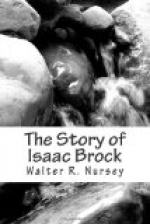Crossing Lake Ontario gave him the opportunity he longed for. He wrote to his brothers collectively, telling them the sundry details of his success, “which was beyond his expectation.” He hoped the affair would meet with recognition at the War Office. Though admitting it was a desperate measure, he told them “it proceeded from a cool calculation of the pros and cons,” and as Colonel Procter had opposed it, he was not surprised that envy now induced that officer “to attribute to good fortune what in reality was the result of my own knowledge and discernment.” But praise and honours, though sweet to our hero, who after all was only mortal, were secondary to the fact that he would be in a position to contribute something to the comfort and happiness of his brothers. The value of the “treasure” captured at Detroit was placed at L40,000. Brock’s share of this was a substantial sum.
“When I returned heaven thanks,” he wrote, “for my amazing success, I thought of you all, your late sorrows forgotten, and I felt that the many benefits which for a series of years I received from you were not unworthily bestowed.” But the hope that they were reunited was always the dominant note. “Let me know, my dearest brothers,” he pleaded, “that you are all again united.” Then, out of his own knowledge, wrought of deep experience in the world’s wide field, he proceeded: “The want of union was nearly losing this province, without even a struggle; rest assured, it operates in the same degree in regard to families.”
Brock’s despatches, with the story of the capture of Detroit and the colours of the 4th Regiment, United States Army, the oriflamme of the “heroes of Tippecanoe,” reached London the morning of October 6th, the anniversary of his birth. His brother William resided close to the city. A tumultuous clangour of bells and booming of guns from St. James’ Park and the Tower of London rent the air. When asked by his wife the reason for the jubilation he jokingly replied, “Why, for Isaac, of course. You surely have not forgotten this is his birthday.” But William, on reaching the city, learned to his amazement that his jesting words were true. The salvoes of artillery and peals of bells were indeed in honour of General Brock’s victory in far-off Michigan.
Neither King nor Imperial Government was slow to recognize our hero’s achievements. The Prince Regent, who expressed his appreciation of Brock’s “able, judicious and decisive conduct,” bestowed upon him an extra knighthood of the Order of the Bath, in consideration, so ran the document, “of all the difficulties with which he was surrounded during the invasion of the Province, and the singular judgment, firmness, skill and courage with which he surmounted them so effectually.”
When the glittering insignia of his new rank reached Canada, Sir Isaac Brock’s eyes were closed in death. His inanimate body, from which one of the noblest souls of the century had fled, lay rigid in its winding-sheet at Fort George.




